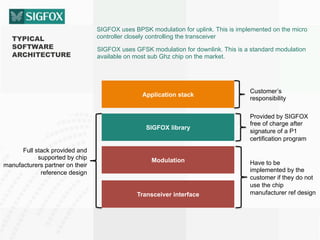Get started on SIGFOX
- 1. GET STARTED ON SIGFOX
- 2. AGENDA VALUE PROPOSITION RADIO TECHNOLOGY NETWORK ARCHITECTURE SECURITY BUILD A DEVICE CONNECT TO SIGFOX CLOUD
- 3. THE NEXT MAJOR TECHNOLOGICAL REVOLUTION BIGGER THAN SMARTPHONES CONNECTING EVERYTHING SO BATTERY POWERED USE CASES ARE SENSING AND TRACKING SO SMALL MESSAGES NEED FOR LOW COST, LOW POWER WIRELESS PUBLIC NETWORK
- 4. SIGFOX (LPWAN) COMPARED SIGFOX FILLS A GAP IN THE MARKET Long  range,  low  bandwidth,  low  power Â
- 5. IN A NUTSHELL VALUE PROPOSITION CHECKLIST ÞïžâŊ Public  network  professionally  managed  ÞïžâŊ Out  of  the  box  connec<vity  -Ââ  no  pairing  with  hub  ÞïžâŊ Low  power  connec<vity  -Ââ  ba?ery  powered  device  ÞïžâŊ Low  upfront  cost  â  hardware  10  x  cheaper  than  cellular  ÞïžâŊ Low  subscrip<on  cost  ÞïžâŊ Jamming  very  complex  ÞïžâŊ Sensing,  monitoring  and  tracking  use  cases    XâŊ Private  network  XâŊ Real-Ââ<me  remote  control  use  cases  (<1s)  XâŊ Frequent  soKware  update  OTA   XâŊ Low  latency  (<1s) Â
- 6. SAMPLE B2B CUSTOMERS Smart  Ci<es  Public  parking  monitoring  Asset  management  Billboard  monitoring  Asset  tracking  Waste  management  U<li<es  Water  metering  Healthcare  Fall  detec8on  Distress  bu:ons  Medicine  dispensers  Home  care  management Â
- 7. SAMPLE B2C CUSTOMERS Pet  tracking  Pet  health  monitoring  Pet  loca8on  services  Security  Remote  alarm  transmissions  Bike  &  car  security  Bicycle  recovery  services  Car  recovery  services  Climate  monitoring  Indoor  air  monitoring  Climate  monitoring Â
- 8. Country covered (80% of population & light indoor) City coverage FRANCE SPAIN UK NL PORTUGAL Korea Singapore Mumbai UmeÃĨ Warsaw Munich ITALY IRELAND CZECH REPUBLICBELGIUM Santiago Bogota COVERAGE AT Q1 2016 DENMARK USA NYC SF LA Seattle Denver Houston Dallas Austin San Jose Boston Atlanta Chicago > 1 MILLION SQ MILES 60 COUNTRIES DEPLOYED WITHIN 5Y + $150M RAISED
- 9. AGENDA VALUE PROPOSITION RADIO TECHNOLOGY NETWORK ARCHITECTURE SECURITY BUILD A DEVICE CONNECT TO SIGFOX CLOUD
- 10. PHILOSOPHY OF SIGFOX NETWORK THE TECHNOLOGY TO MEET THE IOT STRATEGY: -âŊ LOWEST TCO -âŊ OUT OF THE BOX CONNECTIVITY -âŊ LOWEST ENERGY -âŊ GLOBAL REACH FARTHEST SATELLITE FROM EARTH USES UNB BPSK Lowest TCOLowest Energy Bidir is device initiated Sleep time maximized Small messages 14 bytes of header + 12 bytes max of payload Use existing chipsets Global reach Unlicensed spectrum ISM band: ETSI â 868Mhz / FCC â 902Mhz No synchronization with base stations Sleep time maximized â Simple processing Long range to reduce number of base stations Large link budget = 160dB High capacity network for scalability Low radiated power 25mW @ 100bps ETSI 150mW @ 600bps FCC Out of the box connectivity No pairing Public network Strong resistance to interference Ultra Narrow Band BPSK is the way to go
- 11. GUARANTEE OF DELIVERY DIVERSITY REPLACES ACKNOWLEDGEMENT DIVERSITY Each message sent over 3 radio frames -âŊ Time diversity -âŊ Frequency diversity COLLABORATIVE NETWORK Space diversity SIGFOX cloud will receive the 3 radio frames 9 times freq diversity time diversity
- 12. UNB RESISTANCE TO INTERFERENCE UNB BEST TECHNOLOGY AGAINST INTERFERER UNB CONCENTRATES THE ENERGY At equal power UNB concentrates energy in a very small bandwidth = higher power spectral density UNB REDUCES CHANCES OF COLLISION WITH INTERFERER Small bandwidth reduces probability of collision with high power interferer SIGFOX + conventional signals at same spectrum and power à ï no loss COLLABORATIVE NETWORK MITIGATES INTERFERER IMPACT Having 3 base stations at 3 different locations reduces the impact of interferers in the message delivery
- 13. HIGH CAPACITY CAPACITY MEASURED ON THE FIELD UNB IS BEST SUITED FOR HIGH CAPACITY ULTRA NARROW BAND ALLOWS HIGH CAPACITY @ 10message/day/device = 1.8M devices per base station 200 simultaneous messages within a 200kHz channel Future  proof  :  2M  messages  per  base  sta8on  âĶand  aGer  :  cell  size  reduc8on,  add  another  200kHz  channel Â
- 14. UNB VS SPREAD SPECTRUM (SS) BETTER RESISTANCE TO INTERFERER NO COLLABORATIVE NETWORK HIGHER CAPACITY UNB BETTER RESISTANCE TO INTERFERER Interferers in ISM band : SS CANNOT BENEFIT OF THE COLLABORATIVE NETWORK SS has to be a point to point communication Different devices using the same spreading code with different base stations will interfere each other UNB HAS HIGHER CAPACITY -âŊ Can be very high power â FCC req is P<4W -âŊ Are hoping fast â FCC req is less than 400ms Chances of having a blocking interferer in SS are higher than UNB UNB vs SS For same bandwidth more capacity
- 15. AGENDA VALUE PROPOSITION RADIO TECHNOLOGY NETWORK ARCHITECTURE SECURITY BUILD A DEVICE CONNECT TO SIGFOX CLOUD
- 16. Customer IT UPLINK MESSAGE NO NETWORK SYNCHRONIZATION MOST SIMPLE DESIGN PROTOCOL Each uplink message is self contained â less than 26 bytes UPLINK TRANSMISSION preamble frame sync device ID payload container 0 - 4 - 8 â 12 bytes authentication hash CRC Base stations SIGFOX CLOUD 1. Device sends message when needed 2. SIGFOX base stations collect the message 3. SIGFOX cloud authenticates the message and regroup the duplicates 4. SIGFOX cloud pushes the message to the customer IT
- 17. BI DIRECTIONAL MESSAGE DEVICE INITIATED MAXIMIZE SLEEPING MODE Customer ITBase stations SIGFOX CLOUD 1. Device sends message when needed with bidirectional request 2. SIGFOX base stations collect the message 3. SIGFOX cloud authenticates the message and regroup the duplicates 4. SIGFOX cloud pushes the message to the customer IT 5. Customer IT replies to the bidirectional request 6. SIGFOX cloud requests the base station close by to send the reply 7. SIGFOX base station send the message 8. Device gets the reply and acknowledges it
- 18. AGENDA VALUE PROPOSITION RADIO TECHNOLOGY NETWORK ARCHITECTURE SECURITY BUILD A DEVICE CONNECT TO SIGFOX CLOUD
- 19. RADIO SECURITY IDENTIFICATION AUTHENTICATION RESISTANCE TO SPOOFING AND JAMMERS IDENTIFICATION AND AUTHENTICATION Each device contains a unique ID and secure key -âŊ Identification is done with the ID -âŊ Authentication is done with an AES encrypted signature sent in the header RESISTANCE TO SPOOFING Each message contains a sequence number SIGFOX cloud detects differences in the sequence number RESISTANCE TO JAMMING No synchronization is required to send messages on the SIGFOX network So jamming the device receiver will not affect the delivery of the uplink message
- 20. ARCHITECTURE SECURITY SECURITY GUARANTEED FROM END TO END CLOUD REDUNDANCY FOR SLA OF 99.99% Customer ITBase stations VPN tunnel HTTPS REPLICATE SIGFOX CLOUD
- 21. AGENDA VALUE PROPOSITION RADIO TECHNOLOGY NETWORK ARCHITECTURE SECURITY BUILD A DEVICE CONNECT TO SIGFOX CLOUD
- 22. BUILD A SIGFOX READYâĒ DEVICE ÞïžâŊ Choose your FCC SIGFOX ReadyâĒ technological block ÞïžâŊ Sign the relevant SIGFOX ReadyâĒ certification program agreement ÞïžâŊ Get access to SIGFOX cloud and support to build your device ÞïžâŊ Submit your final product to the SIGFOX certification team MINIMUM INTEGRATION EFFORT OUT-OF-THE BOX CONNECTIVITY BUILD A SIGFOX PRODUCT No coverage yet? SIGFOX can loan base stations
- 23. TYPICAL HARDWARE ARCHITECTURE Microcontroller Runs SIGFOX stack. MCU can be dedicated to SIGFOX stack or run the application and the SIGFOX stack Transceiver Generates and decodes RF signals RF front end Amplifies signals for longer range. ETSI spec SIGFOX radios do not need a PA PA/ LNA Tx/Rx MCU App MCU App microcontroller Runs the application of the device Optional if the module MCU is powerful enough for the application Communication module Sensors Sensors Provides the data to your device Battery Battery Sourcing the good battery for your device is key to guarantee its longevity
- 24. TYPICAL SOFTWARE ARCHITECTURE Application stack SIGFOX library Modulation Transceiver interface Full stack provided and supported by chip manufacturers partner on their reference design Have to be implemented by the customer if they do not use the chip manufacturer ref design Provided by SIGFOX free of charge after signature of a P1 certification program Customerâs responsibility SIGFOX uses BPSK modulation for uplink. This is implemented on the micro controller closely controlling the transceiver SIGFOX uses GFSK modulation for downlink. This is a standard modulation available on most sub Ghz chip on the market.
- 25. UPLINK MESSAGE EXAMPLE 12 BYTES ENOUGH FOR SENSING AND TRACKING From 0 to 12 bytes, max 140 messages per day: âĒâŊ 6 bytes: GPS coordinates Location report with below 3m precision (GPS technical accuracy is above 3m) âĒâŊ 2 bytes: temperature reporting Lab thermometer with -100°/+200° range, 0.004° precision âĒâŊ 1 byte: speed reporting Speed Radar up to 255km/h âĒâŊ 1 byte: object state reporting Up to 8 switches report like set in day/night, hot/cold, on/off âĒâŊ 0 byte: heartbeat Object is in working state, battery is OK.... âĒâŊ 0 byte: Request for duplex operation Do you have some information for me?
- 26. BIDIRECTIONAL MESSAGE EXAMPLE CONFIGURATION UPDATE POSSIBLE 8 bytes, max 4 messages per day: âĒâŊ Change configuration (4 billion possibilities) Change operational mode, add color indicator of danger probability... âĒâŊ Adjust sensor scale Change sensor vibration sensibility of seismograph if too many reports... âĒâŊ Adjust messages frequency Request close surveillance of water lever after rain... âĒâŊ Request additional data Request status of solar panel if battery drain is too high... âĒâŊ Request firmware upgrade (through high throughput connection) Ask object to perform an update using GSM because of outdated version...
- 27. AGENDA VALUE PROPOSITION RADIO TECHNOLOGY NETWORK ARCHITECTURE SECURITY BUILD A DEVICE CONNECT TO SIGFOX CLOUD
- 28. MANAGE YOUR DEVICE MANAGE YOUR DEVICES Users are attached to groups and have user rights associated to each group Devices are attached to a device type which is attached to a group and a contract
- 29. CREATE YOUR DEVICE TYPE CREATE YOUR DEVICE TYPE Device type is necessary for the device to be created. Callbacks are managed at the device type level
- 30. CREATE YOUR CALLBACKS CREATE YOUR CALLBACKS Callbacks are actions that will be performed when a message (or an event) arrives on the SIGFOX cloud
- 31. ACTIVATE YOUR DEVICE ACTIVATE YOUR DEVICE A device needs to be associated to a device type































